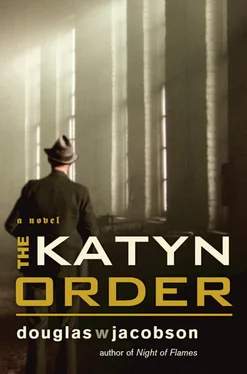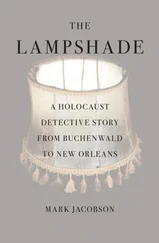As they followed the Russian truck out of the aerodrome, the American officer leaned over to Adam and extended his hand. “Colonel Tim Meinerz, with the Judge Advocate General’s office. I’m head of the investigation team.”
Adam shook his hand. “Adam Nowak. I’m your ‘Civilian Liaison Officer,’ whatever that means.” He jerked his thumb back toward the terminal. “Thanks for your help.”
Colonel Meinerz nodded. “I’m sure they piled it on a little extra for a civilian diplomat. So far they’ve been assholes about everything.”
“Well, you did the right thing. The only way to deal with them is to stick your nose in their face.” Or a knife in their ribs.
Meinerz laughed. “Of course, a couple of Eighty-Second Airborne troopers carrying submachine guns always helps.”
They exited the grounds of the aerodrome, and Adam looked around, squinting, his eyes watering from the dust. He cleaned his glasses and took another look. As far as he could see, not one building was intact. All had been reduced to nothing more than heaps of rubble with an occasional chimney, or the jagged edge of a wall poking through the debris. A smell hung in the air, a musty, masonry smell, like wet concrete mixed with smoke. It did, indeed, look very much like his last memory of Warsaw—and it gave him a morbid sense of satisfaction.
“Technically this area is in our sector,” Colonel Meinerz said loudly over the roar of the Jeep. “But both sides are still arm wrestling about the timing of the handover. For now, the Russians are our ‘escorts,’ and we’re under instructions to follow them. They’ll take a roundabout route to make sure you see the sights. They seem proud of their handiwork.”
Had Adam not been in Warsaw during the last days of the Rising, he wouldn’t have believed it possible to lay waste to a city to this extent. Amidst a never-ending expanse of destruction, the only human activity Adam noticed were small isolated groups of women, ragged shawls over their heads, listlessly clearing away piles of bricks from the fronts of shattered buildings. The closer they got to the center of the city, the more appalling the destruction. The piles of debris became mountains, many still smoldering, the rising heat carrying a nauseating odor of rotting flesh. Burned-out tanks and wrecked trucks stood half-submerged in the muck of bomb craters filled with water from broken mains.
By the time they reached the Landwehrkanal, even the rubble-women had disappeared. Sewer pipes dangled from beneath sections of smashed bridges, disgorging thick, brown liquid into the scum-covered waterway. Adam put his hand over his face to fend off the stench and turned away, glancing up ahead at the Russian truck. The Red Army soldiers lounged in the back, smoking cigarettes.
They followed the roadway along the stinking canal for several minutes, then headed south, away from the city center. Gradually the destruction became less complete, and they passed through neighborhoods where perhaps a third of the buildings were still intact. Little glass remained in any of the windows, and the streets were littered with debris, but the rubble-women had reappeared, shoveling bricks into carts. Now and then a few ragged children scampered over the piles, and two old men, struggling with a cart filled with boards and corrugated metal, stared at them with blank, sullen eyes as the Jeep rumbled past.
Later, they were sitting on the terrace of an immense three-story mansion in Schoenberg, part of the American district of Berlin. The elaborate brick-and-stone structure, complete with marble columns, tiled gables and wrought-iron railings, had somehow survived the Russian bombardments with only a few broken windows.
“The house used to be owned by some big-shot German industrialist,” Meinerz said, handing Adam a bottle of dark and refreshingly cold German beer. “He owned some chemical plants in the Ruhr valley, a loyal Nazi, so I heard. Apparently he and the family fled just before Berlin fell, took only what clothes they could carry and the contents of a wall safe in the drawing room. We commandeered it for American officers, and guests.”
“How fast the mighty can fall,” Adam said, glancing out at the neatly trimmed hedges that surrounded a rose garden just beginning to bloom.
Meinerz took a long swallow of beer, then ran a hand through his thick, curly hair. “I looked over the dossier we received from the Brits. You’re a former American soldier with medals in marksmanship and sniper training?”
“That’s right.”
“But you spent the war as a diplomat in London?”
Adam had prepared himself for how strange that would seem. “I served back in the thirties, peacetime army, Fort Benning, Georgia.” He tapped his eyeglasses. “Since then my eyesight’s gone bad. Probably from all the damn books we had to read in law school.”
Meinerz smiled, taking another swig of beer. “Amen to that.” He pointed at Adam’s left ear. “You get that at Fort Benning?”
Adam shook his head. “London, buzz-bomb explosion, lost part of my hearing as well.”
Meinerz nodded, though Adam guessed he wasn’t completely convinced. “The dossier also said you’re fluent in German as well as English and Polish. And you studied law at Jagiellonian University in Krakow.”
“I returned to Poland in ’36, following my discharge from the army.”
“So, are you up to speed on what we’re doing here and the doctrine of ‘crimes against humanity’?”
“That was part of my course work at Jagiellonian.”
“Though I guess the operative term now is genocide, isn’t it?” Meinerz paused for a moment then added, “By the way, wasn’t it some Polish fellow who coined that term?”
Adam set his beer on a glass-topped table and looked Meinerz in the eye. “Are you testing me, Colonel?”
Meinerz was about to respond, but Adam held up his hand, stopping him. “The man’s name was Lemkin, Raphael Lemkin, a Polish legal scholar who is now an adviser to the U.S. Army. You may have read his book, Axis Rule in Occupied Europe. And, you’re correct; he did coin the term, ‘genocide,’ based on his studies of the slaughter of Armenians by the Ottoman Turks. It seems he agreed with Churchill: ‘the world has come face-to-face with a crime that has no name.’”
Meinerz finished his beer. “No offense, Mr. Nowak—”
“You can call me Adam.”
“No, offense, Adam, but this mission is likely to get pretty dicey. I don’t like surprises.”
“I don’t either. And you may as well know: while I’m here to help you if I can, I represent the Polish Government-in-Exile, and their main concern is to determine the fate of a number of specific individuals.”
“I see. You have a list?”
“I do. Would you like to see it?”
Meinerz shook his head. “Let’s wait and see how cooperative our Russian allies are first. It may take some doing to get into Sachsenhausen. Another beer?”
17 MAY
ADAM WAS UP EARLY the next morning, woken first by the usual dream, then by sounds of an idling engine and voices from outside. He pulled back the curtain and looked out the window. A U.S. Army truck stood on the cobblestone drive, and two soldiers were unloading crates from the back. A gray-haired civilian wearing a tweed suit coat waited nearby.
After he’d washed up and shaved, Adam put on the new navy-blue suit provided by SOE. He left his second-floor bedroom and made his way along the hallway to the main staircase. Amidst the ruins of Berlin it was hard to comprehend the elegance that now surrounded him. He descended the broad oak staircase, glancing at oil paintings of German landscapes lit with wall sconces, powered by a generator Meinerz said was located on the premises. At the bottom he made his way through a richly decorated parlor with a cavernous stone fireplace flanked by floor-to-ceiling bookshelves.
Читать дальше












